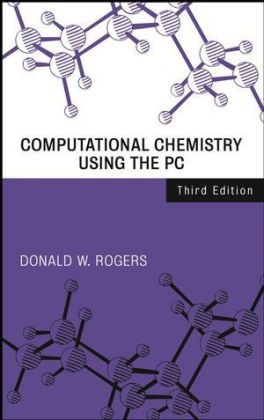Read more
Zusatztext "...superbly organized! and the information is clearly presented! in a great deal of detail...very highly recommended." (Polymer News) Informationen zum Autor DONALD W. ROGERS, PhD, is Professor Emeritus at Long Island University. For forty years, Professor Rogers has taught academic courses in physical chemistry, thermodynamics, general chemistry, computational chemistry, and microcomputer interfacing. He publishes regularly in the Journal of Physical Chemistry and elsewhere, and his work has been supported for the last decade by the National Science Foundation through the National Center for Supercomputing Applications. Klappentext Computational Chemistry Using the PC, Third Edition takes the reader from a basic mathematical foundation to beginning research-level calculations, avoiding expensive or elaborate software in favor of PC applications. Geared towards an advanced undergraduate or introductory graduate course, this Third Edition has revised and expanded coverage of molecular mechanics, molecular orbital theory, molecular quantum chemistry, and semi-empirical and ab initio molecular orbital approaches.With significant changes made to adjust for improved technology and increased computer literacy, Computational Chemistry Using the PC, Third Edition gives its readers the tools they need to translate theoretical principles into real computational problems, then proceed to a computed solution. Students of computational chemistry, as well as professionals interested in updating their skills in this fast-moving field, will find this book to be an invaluable resource. Zusammenfassung Computational Chemistry Using the PC, Third Edition takes the reader from a basic mathematical foundation to beginning research-level calculations, avoiding expensive or elaborate software in favor of PC applications. Geared towards an advanced undergraduate or introductory graduate course, this Third Edition has revised and expanded coverage of molecular mechanics, molecular orbital theory, molecular quantum chemistry, and semi-empirical and ab initio molecular orbital approaches.With significant changes made to adjust for improved technology and increased computer literacy, Computational Chemistry Using the PC, Third Edition gives its readers the tools they need to translate theoretical principles into real computational problems, then proceed to a computed solution. Students of computational chemistry, as well as professionals interested in updating their skills in this fast-moving field, will find this book to be an invaluable resource. Inhaltsverzeichnis Preface to the Third Edition. Preface to the Second Edition. Preface to the First Edition. Chapter 1. Iterative Methods. Iterative Methods. An Iterative Algorithm. Blackbody Radiation. Radiation Density. Wien's Law. The Planck Radiation Law. COMPUTER PROJECT 1-1: Wien's Law. COMPUTER PROJECT 1-2: Roots of the Secular Determinant. The Newton-Raphson Method. Problems. Numerical Integration. Simpson's Rule. Efficiency and Machine Considerations. Elements of Single-Variable Statistics. The Gaussian Distribution. COMPUTER PROJECT 1-3: Medical Statistics. Molecular Speeds. COMPUTER PROJECT 1-4: Maxwell-Boltzmann Distribution Laws. COMPUTER PROJECT 1-5: Elementary Quantum Mechanics. COMPUTER PROJECT 1-6: Numerical Integration of Experimental Data Sets. Problems. Chapter 2. Applications of Matrix Algebra. Matrix Addition. Matrix Multiplication. Division of Matrices. Powers and Roots of Matrices. Matrix Polynomials. The Least Equation. Importance of Rank. Importance of the Least Equation. Special Matrices. The Transformation Matrix. Complex Matrices. What's Going On ...
List of contents
Preface to the Third Edition.
Preface to the Second Edition.
Preface to the First Edition.
Chapter 1. Iterative Methods.
Chapter 2. Applications of Matrix Algebra.
Chapter 3. Curve Fitting.
Chapter 4. Molecular Mechanics: Basic Theory.
Chapter 5. Molecular Mechanics II: Applications.
Chapter 6. Huckel Molecular Orbital Theory I: Eigenvalues.
Chapter 7. Huckel Molecular Orbital Theory II: Eigenvectors.
Chapter 8. Self-Consistent Fields.
Chapter 9. Semiempirical Calculations on Larger Molecules.
Chapter 10. Ab Initio Molecular Orbital Calculations.
Bibliography.
Appendix A: Software Sources.
Index.
Report
"...includes a wealth of computer projects, exercises...and problems to challenge any group of sharp, industrious students." (Computing Reviews.com, December 30, 2004)
"If one is looking for a text that introduces students to the use of computers to solve chemical problems with the intent of moving those students on to the study of molecular structure, then this is a fantastic textbook." (Journal of Chemical Education, October 2004)
"The book is a worthwhile addition for any library and will be of use for several years to come." (Journal of Metals Online, September 1, 2004)
"...this text is a real gem...should be considered by anyone contemplating developing course material in the area of computational chemistry." (Journal of Medicinal Chemistry, May 20, 2004)
"...superbly organized, and the information is clearly presented, in a great deal of detail...very highly recommended." (Polymer News)

